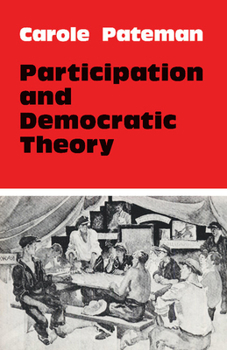Participation and Democratic Theory
Select Format
Select Condition 
Book Overview
Shows that current elitist theories are based on an inadequate understanding of the early writings of democratic theory and that much sociological evidence has been ignored.
Format:Paperback
Language:English
ISBN:052129004X
ISBN13:9780521290043
Release Date:January 1976
Publisher:Cambridge University Press
Length:132 Pages
Weight:0.45 lbs.
Dimensions:0.4" x 5.5" x 8.4"
Customer Reviews
1 rating
More relevant today that when it was written
Published by Thriftbooks.com User , 15 years ago
It has taken me several years of good intentions to finally read a book that I have seen regularly referenced by leading writers on democratic theory in the business world. Carole Pateman's book is surely worthy of being called a 'classic' not simply for its academic rigour, but for its careful and considered analysis of the contribution of democratic theory to a wholesale reform of business and management practices. Although the text is short, it is a careful and intensive critical analysis of 'democratic theory' that has prevailed since Schumpeter's 1940s work. The first part of the book, inevitably, deals with the influence of Schumpeter's attempt to revise democratic theory to one based on non-participation by the masses, based on periodic elections. As Pateman is at pains to point out, Schumpeter conceived democracy as a popular contest for the votes of a (largely ignorant) electorate. She makes a convincing argument, through careful analysis of the authors who preceded Schumpeter, that this was an unashamedly elitist project that sought to subvert and prevent mass participation in both political and workplace decision-making by systematically denying people the developmental opportunities that arise through mature systems of participation. Pateman carefully describes a number of inter-related traditions (centred on the work of Rousseau, J. S. Mill and J. D. Cole) that theorise democracy as a system of direct and indirect involvement in decision-making at all levels of society. In the course of this argument, she demonstrates how the workplace will be the heartland of any future project to democratise society. A key strength of the book is that it critically analyses the claims of different theorists using a wealth of social science studies. These provide credible resources to evaluate the viability and robustness of the arguments made by different democratic theorists. As a result, Pateman demonstrates the social science support for participatory democracy as viable alternative to non-participatory 'representative democracy'. Especially interesting - for me - was a review of the social, economic and political achievements in the first 20 years of Yugoslavian worker democracy. While it is tempting to argue that history has rendered this "experiment" obsolete, it is clear from contemporary movements in South America (particularly Argentina and Venezuela), as well as the continuing growth of cooperative and employee-ownership movements worldwide, that the kind of integrated systems of worker democracy pioneered in Yugoslavia continue to have enduring relevance for the politicians and practitioners of today. Eschewing both the state-socialism model of Russia and China, as well as the free-market orthodoxy of Hayek and Friedman, the Yugoslavian attempt at bottom-up economic reform based on widespread worker-participation clearly had successes that others are (knowingly or not) replicating around the globe. For all those involved i





